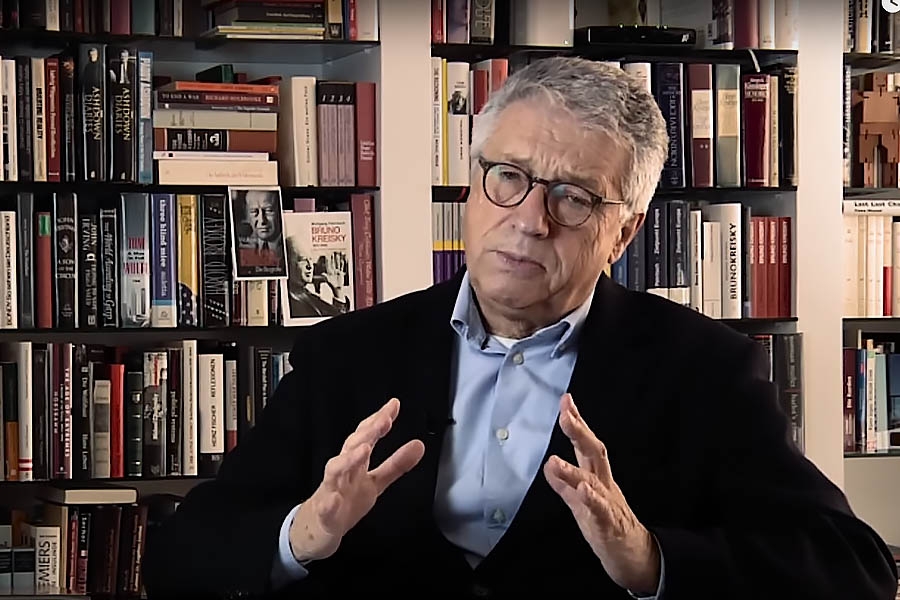Asked who is to blame for the deteriorating security situation in Kosovo, Petritsch said:”there are always two sides in any tensions. I see this as an external observer and I have to say that the EU should act more decisively and not allow the security situation to deteriorate further".
This year we have seen some progress in Brussels and Ohrid. Now is the time to implement what was agreed upon in these meetings.

Asked who is to blame for the deteriorating security situation in Kosovo, Petritsch said:”there are always two sides in any tensions. I see this as an external observer and I have to say that the EU should act more decisively and not allow the security situation to deteriorate further".
This year we have seen some progress in Brussels and Ohrid. Now is the time to implement what was agreed upon in these meetings.

It is by far the most dangerous crisis since the unilateral declaration of independence (Kosovo) in 2008. Things can easily get out of control and destroy everything that has been achieved in the dialogue between Belgrade and Pristina under the auspices of the European Union over the past ten years. What we need now is a new attempt by Brussels to bring the two sides back to the negotiating table, Wolfgang Petritsch, an experienced Austrian diplomat, told for Demostat.
Petritsch is a former European Union Special Envoy for Kosovo and former International Community High Representative for Bosnia and Herzegovina. Also, he participated on behalf of the European Union as a mediator in the Rambouillet negotiations, conducted between the delegations of Belgrade and Pristina in March 1999. At the time, there were Serbs on one side, Kosovo Albanians on the other, and the US, Russia and the Union - Christopher Hill, Boris Majorski and Wolfgang Petrich-mediated.
Speaking about the tragic events that recently took place in the village of Banjska in northern Kosovo (when an attack by a group of Serbs on the Kosovo police killed an Albanian policeman, and then in a confrontation between the police and an armed group killed three Serbs), our interlocutor warns: “confrontation would only bring this region back”.
Normalization is essential, as it would create the preconditions for economic progress. Thats what people want, Im sure. There are too many young and talented citizens leaving their homes to emigrate to more peaceful countries, such as Austria, Germany and Switzerland. But Europe wants to see prosperity, not conflict in the countries of the former Yugoslavia. The era of war is over. Now we need to rebuild the economy and guarantee a better life for the citizens, says Petrich.
Wolfgang Petritsch answered in the affirmative when asked if he fears that rising tensions in Kosovo could escalate into an armed conflict. "There is such a danger, but Brussels and Washington are ready to prevent any escalation. We must not go back to the wars of the past”, he stressed.
Asked who is to be blamed for the deteriorating security situation in Kosovo, Petritsch said:”there are always two sides in any tensions. I see this as an external observer and I have to say that the EU should act more decisively and not allow the security situation to deteriorate further”.
Speaking about the steps that the international community should take to calm the new tensions, the Austrian diplomat points out:”the international community, especially the EU and the US, must force both sides to return to dialogue”.
“This year we have seen some progress in Brussels and in Ohrid. Now is the time to implement what was agreed upon at these meetings. The German-French proposal remains the best roadmap for de-escalating tensions. I hope that Paris and Berlin will return to their role of actively supporting the EU in its efforts to normalize relations between Belgrade and Pristina. There is no other plan that would be successful, Petritsch claims.
Asked whether” international actors“, such as Russia and Turkey, could use the current tensions in Kosovo for their own benefit, Wolfgang Petritsch assessed: "there is always a danger that external actors use their spoiling techniques to score political points. This must be stopped because it is detrimental to both Serbia and Kosovo. The Western Balkans must become part of the European Union, which should have happened a long time ago. What we need is to focus again on the European policy of the enlargement process across this region. Only in the European Union will there be more economic and social benefits for citizens”.
Commenting on Serbian President Aleksandar Vucics request for KFOR to take responsibility for all security issues in the north of Kosovo (instead of the Kosovo police), Petritsch said: ”As in the case of Bosnia, where EUFOR forces have recently been strengthened, I believe that the strengthening of international peacekeepers in Kosovo is a necessary option. This must be agreed upon by all parties involved and this must be supported by the United Nations”. NATO announced yesterday that it had approved the deployment of additional forces due to rising tensions in northern Kosovo and called on “all sides to urgently de-escalate”. "We will always ensure that our commander has the resources and flexibility necessary for KFOR to fulfil its mandate,” NATO Secretary General Jens Stoltenberg said in a statement. Serbian ambassador to Washington, Marko Djuric, said on Friday that the only way Serbia sees as a way forward is for NATO forces to take control of northern Kosovo. The need to deploy additional international peacekeepers in the area was among the first to be publicly discussed by German political scientist Franz-Lothar Altmann. He said in a statement for Demostat on Thursday, among other things: "the international community should deploy additional international police forces, KFOR and EULEX, in the North. Just repeating that Pristina and Belgrade should return to dialogue is not enough! There are too many words and not enough actions”. Franc-Lotar Altman: Potrebno je rasporediti dodatne medjunarodne snage na sever Kosova (demostat.rs).
In all societies there are issues that are rather being skipped. Certain...
The neoliberal path, started in 2001, has led to especially bad results in Serbi...
For centuries, the region was subsumed within the Ottoman and Hungarian Empires,...
"Serbia has returned to the systemic and anti-systemic position of the political...
In reality, Serbia is closer than ever to NATO. In the course of the last five y...